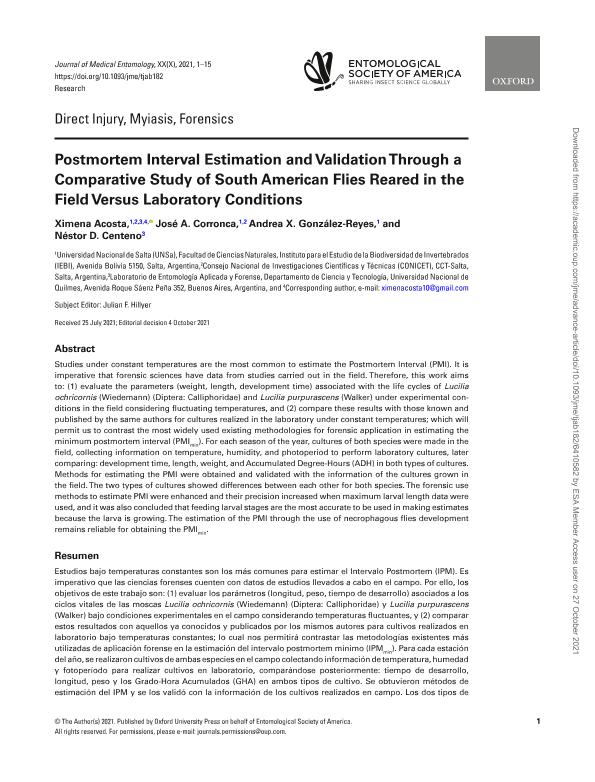Artículo
Estudios bajo temperaturas constantes son los más comunes para estimar el Intervalo Postmortem (IPM). Es imperativo que las ciencias forenses cuenten con datos de estudios llevados a cabo en el campo. Por ello, los objetivos de este trabajo son: (1) evaluar los parámetros (longitud, peso, tiempo de desarrollo) asociados a los ciclos vitales de las moscas Lucilia ochricornis (Wiedemann) (Diptera: Calliphoridae) y Lucilia purpurascens (Walker) bajo condiciones experimentales en el campo considerando temperaturas fluctuantes, y (2) comparar estos resultados con aquellos ya conocidos y publicados por los mismos autores para cultivos realizados en laboratorio bajo temperaturas constantes; lo cual nos permitirá contrastar las metodologías existentes más utilizadas de aplicación forense en la estimación del intervalo postmortem mínimo (IPMmin). Para cada estación del año, se realizaron cultivos de ambas especies en el campo colectando información de temperatura, humedad y fotoperíodo para realizar cultivos en laboratorio, comparándose posteriormente: tiempo de desarrollo, longitud, peso y los Grado-Hora Acumulados (GHA) en ambos tipos de cultivo. Se obtuvieron métodos de estimación del IPM y se los validó con la información de los cultivos realizados en campo. Los dos tipos de cultivos mostraron diferencias entre sí para ambas especies. Los métodos de uso forense para estimar el IPM aumentaron su precisión cuando se usaron datos de longitud larval máximos, asimismo se concluyó que los estadios larvales alimentarios son los más precisos para ser usados en la realización de estimaciones debido a que la larva está creciendo. La estimación del IPM a través del uso del desarrollo de moscas necrófagas sigue siendo fiable para la obtención del IPMmin. Studies under constant temperatures are the most common to estimate the Postmortem Interval (PMI). It is imperative that forensic sciences have data from studies carried out in the field. Therefore, this work aims to: (1) evaluate the parameters (weight, length, development time) associated with the life cycles of Lucilia ochricornis (Wiedemann) (Diptera: Calliphoridae) and Lucilia purpurascens (Walker) under experimental conditions in the field considering fluctuating temperatures, and (2) compare these results with those known and published by the same authors for cultures realized in the laboratory under constant temperatures; which will permit us to contrast the most widely used existing methodologies for forensic application in estimating the minimum postmortem interval (PMImin). For each season of the year, cultures of both species were made in the field, collecting information on temperature, humidity, and photoperiod to perform laboratory cultures, later comparing: development time, length, weight, and Accumulated Degree-Hours (ADH) in both types of cultures. Methods for estimating the PMI were obtained and validated with the information of the cultures grown in the field. The two types of cultures showed differences between each other for both species. The forensic use methods to estimate PMI were enhanced and their precision increased when maximum larval length data were used, and it was also concluded that feeding larval stages are the most accurate to be used in making estimates because the larva is growing. The estimation of the PMI through the use of necrophagous flies development remains reliable for obtaining the PMImin.
Postmortem Interval Estimation and Validation Through a Comparative Study of South American Flies Reared in the Field Versus Laboratory Conditions
Acosta, Ximena Gisela del Milagro ; Corronca, Jose Antonio
; Corronca, Jose Antonio ; Gonzalez Reyes, Andrea
; Gonzalez Reyes, Andrea ; Centeno, Néstor Daniel
; Centeno, Néstor Daniel
 ; Corronca, Jose Antonio
; Corronca, Jose Antonio ; Gonzalez Reyes, Andrea
; Gonzalez Reyes, Andrea ; Centeno, Néstor Daniel
; Centeno, Néstor Daniel
Fecha de publicación:
01/2022
Editorial:
Entomological Society of America
Revista:
Journal of Medical Entomology
ISSN:
0022-2585
e-ISSN:
1938-2928
Idioma:
Inglés
Tipo de recurso:
Artículo publicado
Clasificación temática:
Resumen
Palabras clave:
IPM
,
TEMPERATURA FLUCTUANTES
,
TEMPERATURA CONSTANTES
,
CALLIPHORIDAE
,
LUCILIA
Archivos asociados
Licencia
Identificadores
Colecciones
Articulos(CCT - SALTA-JUJUY)
Articulos de CTRO.CIENTIFICO TECNOL.CONICET - SALTA-JUJUY
Articulos de CTRO.CIENTIFICO TECNOL.CONICET - SALTA-JUJUY
Citación
Acosta, Ximena Gisela del Milagro; Corronca, Jose Antonio; Gonzalez Reyes, Andrea; Centeno, Néstor Daniel; Postmortem Interval Estimation and Validation Through a Comparative Study of South American Flies Reared in the Field Versus Laboratory Conditions; Entomological Society of America; Journal of Medical Entomology; 59; 1; 1-2022; 147-161
Compartir
Altmétricas



